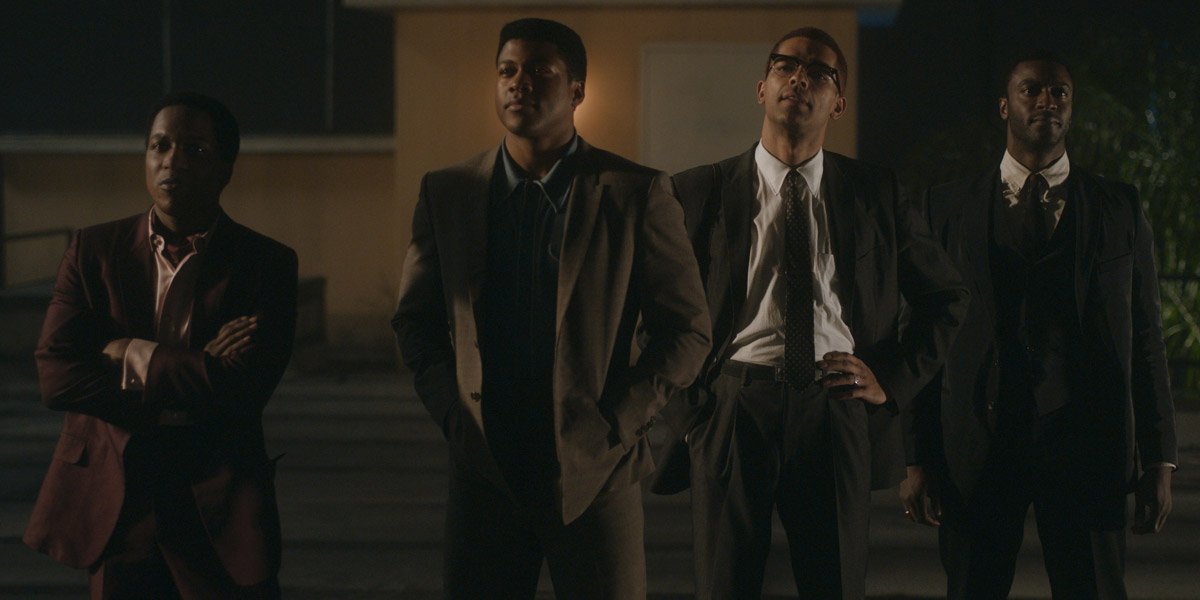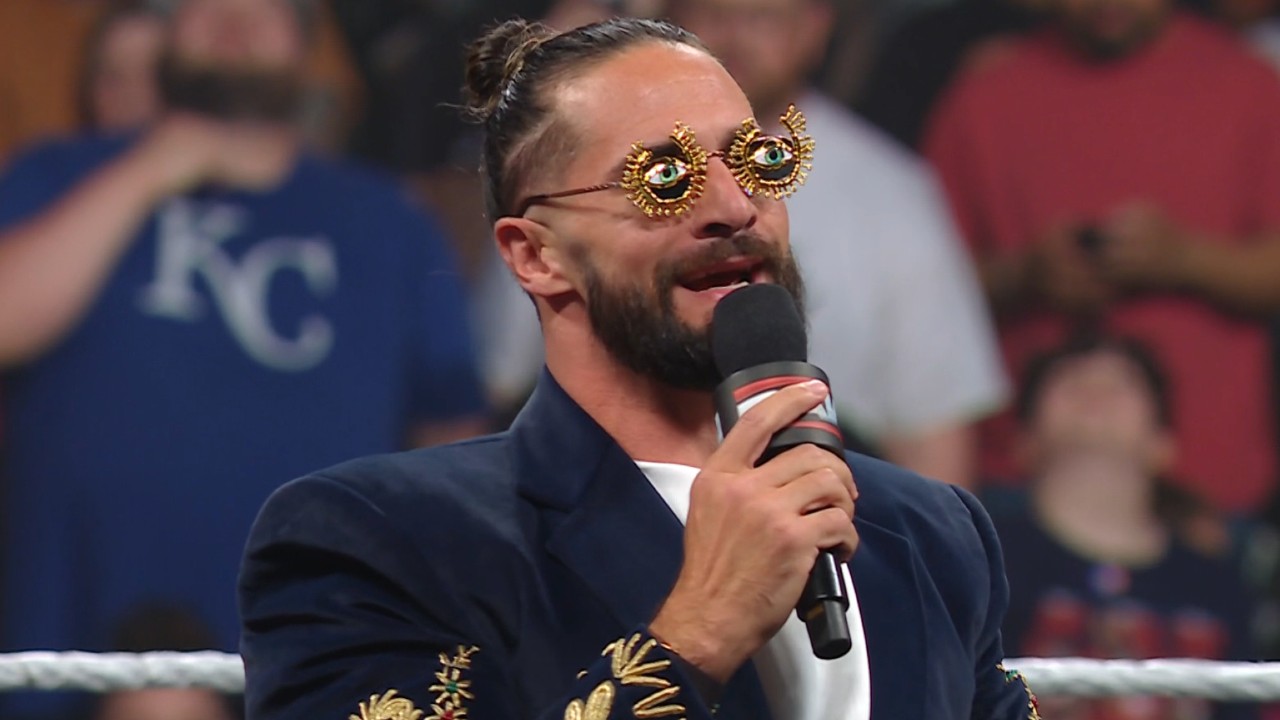There has been a fascinating trend establishing itself in 2020, where contemporary filmmakers are telling stories from our past, but drawing thick lines of connectivity that attach lessons of the past to problems of our current day. Aaron Sorkin illustrating police-brutality protests in The Trial of the Chicago 7 could have been lifted from headlines of our day. Spike Lee’s Da 5 Bloods tackled systemic racism during the Vietnam War-era, but carried that story all the way up to the Black Lives Matter conversations of 2020 (and beyond).
To this prestigious list we can now add Regina King’s remarkable One Night in Miami, an adaptation of Kemp Powers’ stage play of the same name that presents fictionalized conversations that took place after an actual event. Jim Brown (Aldis Hodge), Malcolm X (Kingsley Ben-Adir), Sam Cooke (Leslie Odom Jr.) and Cassius Clay (Eli Goree) have gather together in a Florida hotel room after the celebrated boxer defeated Sonny Liston to claim the title of World Heavyweight Champion. Their dialogue -- the issues they face and the concerns they carry -- speaks volumes about where we were as a nation… and where we potentially could have been heading. But King’s fluid presentation of the stage play’s complicated ideas helps One Night in Miami sing with a vibrancy and an urgency that precious few other films released this year can boast.
One Night in Miami solidifies Regina King as a storyteller to watch.
Movies adapted from stage plays have the tendency to adhere too closely to their stage roots. They feel restricted by the boundaries of the physical stage, and don’t figure out how to take the material into the real world, where it can dance around, breathe and enhance the concepts that are being presented in the text.
One Night in Miami doesn’t have that problem. While the bulk of the action is contained to a Miami hotel room, King discovers ways that she can follow these four individuals into pivotal locations that expand on who they are, and their contributions to our culture. In doing so, King also is able to flex her visual storytelling muscles in the realms of sport, song, politics and religion. It says so much about her confidence that she seems as comfortable staging Sam Cooke (Leslie Odom Jr.) encountering blatant racism at the famed Copacabana night club as she is dancing around the boxing ring with Eli Goree’s Cassius Clay during a pivotal match.
Whether capturing intimate scenes with the complicated individuals who are finding their way through complicated times, or painting the larger-than-life reasons why their struggles should resonate with us today, King masters her film’s method of conversation, and avoids it looking or sounding like a play put to film.
One Night in Miami pulls off the difficult act of balancing all four legendary personalities.
Though, if we are being totally honest, Eli Goree’s exquisite Cassius Clay owns the evening, followed very closely by Kingsley Ben-Adir’s conflicted Malcolm X. Part of that is because the wish that Brother Malcolm has for his talented friend, Cassius, bolsters the biggest conversations to be had in One Night in Miami. At the start of this story, Clay has not fully embraced the Nation of Islam, and has not declared himself to be Muhammad Ali. That groundbreaking decision feeds into the largest theme of One Night in Miami: What are influential people doing with their influence to make the world a better place?
Jim Brown, by this stage, was setting records in the NFL. But what do they matter if he’s still not able to go into a white man’s home because of decades of built-up racial tensions? Songwriters like Bob Dylan at the time (February 1964, to be exact) were making waves with the lyrics. Is Sam Cooke obligated to do the same with his music?
Your Daily Blend of Entertainment News
Malcolm X believes it to be so, but the reasons why Clay, Cook and Brown have for hesitating are relevant, compelling and emotionally devastating. One scene involving Brown and the blunt ignorance of racism lands like a punch to the gut in one of the film’s most visceral sequences. What balances the cultural impact of One Night in Miami is the lighthearted swagger and magnetism provided by Goree, who creates one of the most accurate depictions of the “pretty” superstar I can recall seeing on screen.
One Night in Miami says as much about today as it did 1964.
And this goes back to the point I made at the beginning, that history is cyclical, and several important movies released in 2020 remind us how the lessons of our past can inform our present and future.
That can be depressing. Or even a little disheartening. Especially in Spike Lee’s Da 5 Bloods, where the scenes of Black Lives Matter Protests virtually slap us in the face as we’re forced to ask ourselves why we haven’t progressed as a society from the tumultuous times ,of the 1960s. So much time has passed. What have we been doing?
One Night in Miami seems to ask those same questions while posing similarly important ones: What else can we do? On this fateful evening, four very powerful men who held influence in different spheres were confronting the hard truth that the righteous path forward was in their grip, though capitalizing on this well-earned success would come with obstacles. In one jaw-dropping soliloquy, Cassius Clay comments that he has conquered the sport of boxing, and he was only 22.
Should a man so young possess so much? Is a man at fault if he attains that influence, then does nothing with it? I don’t have those answers, but thanks to Regina King’s spectacular One Night in Miami, I’ll be mulling it over for weeks and months to come.

Sean O’Connell is a journalist and CinemaBlend’s Managing Editor. Having been with the site since 2011, Sean interviewed myriad directors, actors and producers, and created ReelBlend, which he proudly cohosts with Jake Hamilton and Kevin McCarthy. And he's the author of RELEASE THE SNYDER CUT, the Spider-Man history book WITH GREAT POWER, and an upcoming book about Bruce Willis.

